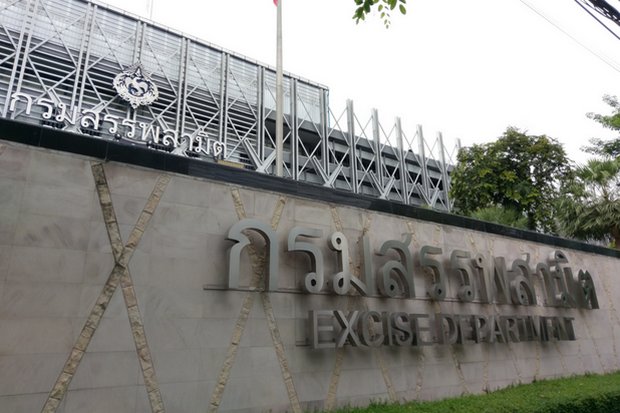
Organic laws concerning the new excise tax rates, which will apply to all products subject to excise duties except for alcohol and cigarettes, will top the cabinet's agenda this week.
The cabinet will seek to approve new duties for alcohol and cigarettes shortly before the new excise tax regime comes into force on Sept 16. The move is aimed at preventing people from hoarding products to reap windfall profits, said an informed source at the Finance Ministry.
The Excise Department insists that the new excise tax structure will not add a significant burden to operators, the source said.
The new excise tax will mark a radical change in how taxes are computed for products spanning vehicles, alcohol, cigarettes, non-alcoholic drinks, batteries, crystal glass and air conditioners.
The system replaces the existing ex-factory prices and cost, insurance and freight (CIF) values with suggested retail prices. The Excise Department hopes that the new basis will create a fairer system for manufacturers and importers after the revelation that some businesses were exploiting ex-factory and CIF values to understate their tax bills.
The source said the new excise tax will cap the variance in price tags of cars set by independent car distributors (known as grey-market operators) and authorised dealers at 15%, a move to stem loopholes used by grey-market distributors in understating tax bills.
The new tax will require car prices set by grey-market operators to be at least 85% of those fixed by authorised dealers. At present, some grey-market dealers declare selling prices of 30-40% lower than those of authorised dealers; the government loses considerable tax revenue as a result.
The Finance Ministry source said the Excise Department's permission for grey-market dealers to use prices lower than those of authorised dealers in calculating import duty is because the former has lower overhead costs than authorised dealers and they do not provide after-sale service to buyers.
For authorised car dealers, the Excise Department will use the price stated in the eco sticker as the basis for duty computation, the source said.
In the case of alcohol, non-alcoholic drinks and cigarettes, the tax-collecting agency will survey prices from mom-and-pop shops, convenience stores and modern trade to set the mode used as the reference price for excise tax calculation, the source said.
If any vendors sell these products at below the Excise Department's mode, the agency has a mandate to demand that they raise their retail prices to at least 95% of the mode, the source said.
Grey operators untroubled
Somsak Sriratanaprapas, chairman of the Independent Car Importer and Distributor Association, said the new method for computing car excise tax will have no impact, since it will be based on suggested retail prices from Sept 16 on.
"Differences in pricing between authorised dealers and grey operators are smaller if car models and specifications are similar; once car specifications start to differ, the price tag gap widens," said Mr Somsak, who is also owner and president of BRG Group, a grey-market importer.
For grey operators, the new computation will increase imported car prices by 5%, starting from next month, he said.
Toyota's popular Alphard, for example, retails for 2.6-3 million baht in the grey market, but the Alphards that Toyota Motors Thailand imports from Japan have price tags of 3.7-5.3 million baht, according to the company's website.
Independent car importers and distributors have asked the Finance Ministry to cut vehicle import tariffs from 80% to 30% to help shore up sales.
In mid-June, in a letter sent to the ministry, the operators requested that the 80% rate, which has been effective for 30 years, be revised.
Mr Somsak said the current car import duty is too high for grey-market operators to run their businesses effectively, as they have to compete with authorised distributors.
Apart from customs duty, all imported vehicles are subject to a 10-50% excise tax based on CO2 emissions, a 10% interior tax and a 7% value-added tax, just like Thai-made vehicles.
"After all taxes are applied, the import vehicles cost up to 116-328% from declared prices and Thai buyers have to shoulder all these taxes," Mr Somsak said, adding that the grey market just wants the import duty to reflect current market circumstances, and the 30% rate will equal that of Asean countries such as Malaysia.
"Moreover, the 30% import duty is expected to reduce cases of false declaration for vehicles," he said.
Grisnagorn Sawettanan, chief executive of Meister Technik Co, the authorised importer and distributor of Audi cars, said the company is willing to follow all regulations issued by the government because it aims to conduct all its importing and selling legally.
He said that while the company is not aware of the new excise tax formula, Meister Technik will try to absorb any increases in price, rather than passing them on to consumers.